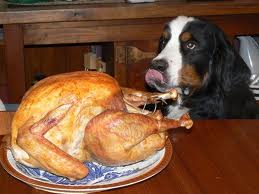Mountainview Small Animal Hospital Blog
PANCREATITIS
 PANCREATITIS AND THE HOLIDAYS:
PANCREATITIS AND THE HOLIDAYS:
Being in the midst of the holiday season, we thought it prudent to bring up the most common disease we see during this time: PANCREATITIS.
This is a disease in which the pancreas (the digestive enzyme organ of the body) becomes inflamed due to inappropriate food or treat consumption or a pet getting into the trash and helping themselves to leftovers. The most common history we hear from clients on a pancreatitis patient is: we gave them table food, or some scraps off our plate, or they got into the trash, etc. All of these can cause anywhere from a mild upset stomach, to acute vomiting and bloody diarrhea with severe gastroenteritis. The easiest way to prevent this from occurring is not feeding people food of any kind and encourage guests to refrain from doing so as well. Obviously, if the pet is persistent enough, some may be able to wheedle a bite of food here and there or get into the trash when no one is looking, even if the trash cans are covered. If that happens and your pet seems out of sorts, the most common symptoms to be on the lookout for are depression, anorexia and vomiting (often with bile) and diarrhea. If your pet seems only mildly ill or “off”, it would still be best to have him checked- just to be on the safe side. This is not a condition one wants to wait on.
The standard treatment is to run bloodwork to verify if the pancreas is inflamed and if so, hospitalize with IV fluids, antibiotics, anti-nausea medication, and once the vomiting stops, a bland diet which will allow the pancreas to heal. Pancreatitis often has a good prognosis if you catch and treat early and once the pancreas has had a chance to heal, there is usually no long term effects.
Occasionally, some pets may have a chronic pancreatitis that lasts a long time, but symptoms may be sporadic. This disease is more difficult to treat and can sometimes lead to loss of pancreatic function later on in life, like diabetes or pancreatic insufficiency. Prevention is still the best treatment, so if you can avoid feeding your dogs people food, the risk is low for pancreatitis. However, some breeds are more predisposed to this disease, like small breeds like Maltese, Yorkies, Dachshunds, also Schnauzers and Shelties have a higher risk of this disease. Cats can also develop this disease, but it is less common and is more likely associated with liver inflammation also. Cats must be treated more aggressively as well.
I hope this answers some questions, and also helps prevent some dogs from getting pancreatitis.
